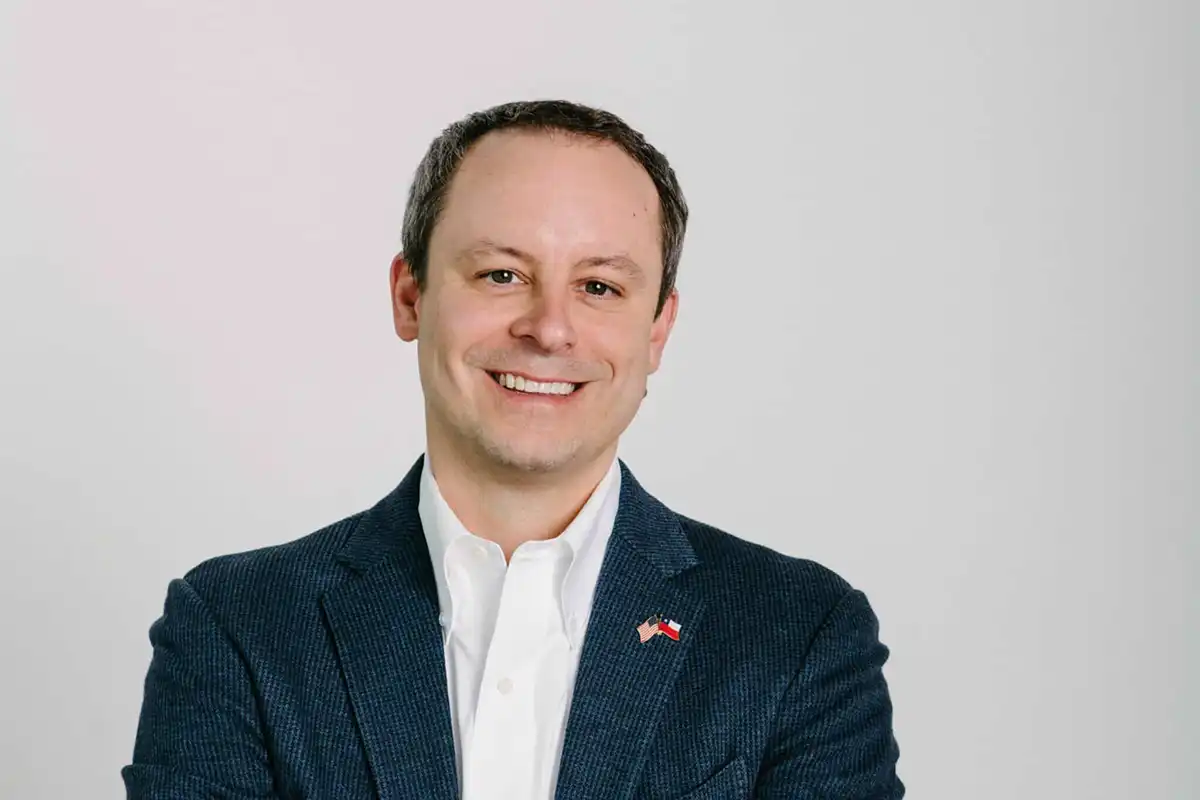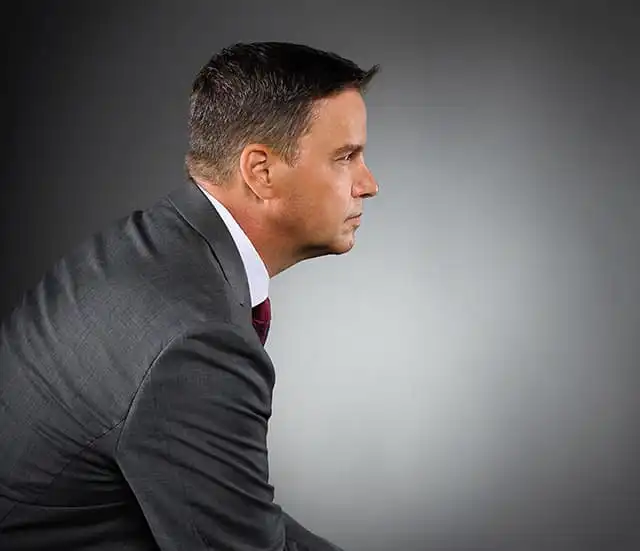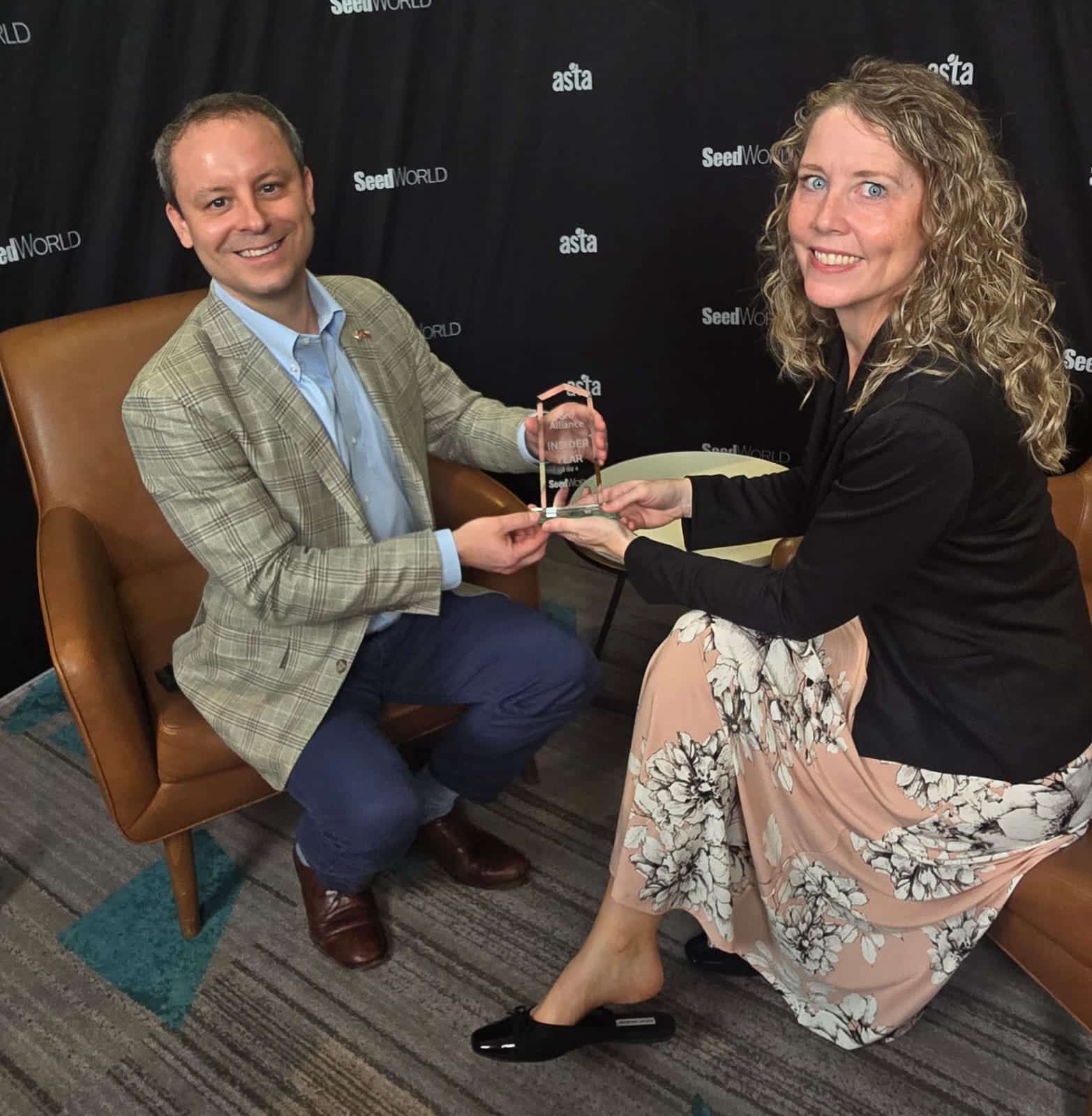Though the seed sector wasn’t Jim Schweigert’s original end goal, a story inspired his return to the family business.
What kind of story would move you to leave your current job for another one? I think all of us would agree — it would need to be a heck of a strong story.
For Jim Schweigert, that story was the developing life of the seed industry.
At the time in 2003, Schweigert was working for a major PR firm in Atlanta, Ga., as a young graduate who was always looking for something new. He had never had a chance to live in the South, and he was dipping his toes back into the realm of agriculture by working with the National Peanut Board and the Unite Georgia anti-smoking campaign. Though he was working with the National Peanut Board, he didn’t quite have the desire to return home to his family’s business in Cuba City, Wis., Gro Alliance.
“After spending a year in Atlanta, the seed business back home was going through some changes — especially with new growth opportunities on the horizon,” Schweigert, now president of Gro Alliance and chair of the American Seed Trade Association (ASTA), says. “My dad (Lou) called me and asked if I wanted to come back and join the family business. We had a really good conversation, but at the time, I said I was enjoying the start of my PR career, and it was my chance to be outside of the business. So, I stayed.”
But, Schweigert’s father wasn’t quite done with the conversation yet. After some reflection a few months down the road, Schweigert remembers a second call from his dad that started: “You know, I probably didn’t do a good enough job explaining to you what the seed industry is.”
Though Schweigert grew up in the seed business, his perspective of it was formed by his experiences participating in the business at a young age. He hadn’t yet seen the full scope of the company or industry.
Growing up in the family business started when Schweigert’s parents took over the family farm and seed selling business in 1977 from his grandpa who founded the company in 1941 in Bruce, Wis. He grew up doing all the different seed farm activities — laying irrigation pipe, running tillage equipment, bailing hay, detasseling, sorting corn, stacking bags… everything from the beginning to the end. It was an experience mirrored by a lot of independent family seed companies back in that time frame — instead of seeing the business side of the industry, his perspective was more of the farming side.
Even after the business changed in the early 1990s from a more farming-focused operation to a seed selling-focused operation, Schweigert still participated more on the production side of things — stacking backs and driving forklifts after schooo and running detasseling machines and crews during the summer.
“That was my view on the seed business — the manual work side of it, like I did when I was young,” Schweigert says. “I was looking to see what else we could do and looking for something different. Little did I know how incredibly important that foundational experience would be throughout my career! Learning the business form the ground up has proven to be invaluable.”
Fast forward to 2003, and the seed sector looked entirely different.
“I didn’t understand the entire industry, and the company had changed a lot since I graduated high school,” Schweigert says. “That’s when I really got to understand how important the seed industry is to agriculture and to society in general.”
By the time Schweigert finished high school, GMOs were just being developed, and Schweigert says he had very little experience with them and didn’t understand the impact that they could have.
“All of a sudden, now there’s more traits on the market, and you can see the impact to farmers and growers,” he says. “The opportunity for seed companies, especially in what we had been doing was really exciting. The science and innovation side of the industry was incredibly exciting, and I could see how our company could enable those technologies by partnering with seed companies and the innovators. This is what motivated us to exit the branded sales side of the business and focus 100% on providing seed supply chain solutions to seed companies and technology developers.”
If there’s one thing that experience taught him, it’s that the seed industry needs to get it message out.
“If you tell your story, people will be genuinely impressed. People will listen and they’ll understand how your company impacts food security, fuel, feed and fiber for the country and for the world,” he says, noting that it’s not only important to tell the story to outsiders, but to ensure employees at every level of a business understand the motivations behind the business as well.
“Even when you have employees today who are working in the facility, loading trucks, delivering seed to your customers… They’re doing all the duties that have to be done day-by-day, but maybe only you, as a leader or manager in the business, understand how that all fits into the context of the broader industry and business,” he says.
If you don’t explain it to them, there’s no way for the entire team to see its impact, Schweigert says.
“They love to hear those stories about what’s going on in the business and ways that we’ve impacted a client positively and helped somebody achieve something that they couldn’t have done on their own,” he adds.
“That conversation with my dad really changed my perspective of what the future of our business could be. I was thinking about it in the context of how we could be a provider to the industry and make a difference for seed companies that work with us,” Schweigert adds. “Today, we are largest family-owned seed supply chain solutions company in North America. We have five locations, a joint-venture in Chile (CIS Alliance), expertise from custom breeding services to direct-to-farm distribution and experience across more than 10 crops.”
Your Voice is Important
That conversation with his father drove Schweigert’s decision to move back home to the Cuba City area to get involved with the family business again, with one lesson sticking out to him: how can I get more actively involved with the seed industry to not only propel our business, but better learn and grow?
Getting active and involved in organizations was something Schweigert learned in his days at the University of Minnesota — by actively participating in clubs and organizations around his passion for PR, he was able to secure internships, job offers and new opportunities to grow and learn about the industry. It seemed only natural to him that the next step for his career in the seed industry was to find how to get more involved.
Enter his first ASTA conference — the 2003 ASTA CSS & Seed Expo in Chicago, Ill. While it was intimidating going and not knowing anyone, a face familiar to the industry helped Schweigert get to know different ASTA members: Don Wertman.
“It was a 3,000-person conference, and man, was it intimidating!” Schweigert says, noting his goal was to meet as many people as possible at the conference.
After bumping into Wertman, the chair of ASTA at the time, at a retirement party Schweigert mentioned that it was difficult to meet people at the conference. Schweigert says that Don took the criticism of the conference with grace.
“He could not have been more gracious about the whole thing,” Schweigert says. “He said: ‘You know, this is a weakness that the industry has, and if we’re going to successfully manage these generational transitions, we have to have more younger people in the association.’”
In addition to helping introduce Schweigert to various people at the conference, the chance encounter with Wertman turned into a few follow up calls, and eventually turned into a relationship as Wertman continued to encourage Schweigert to get involved with ASTA. It started with attending the CSS & Seed Expo, then the ASTA Management Academy at Purdue University in 2004, where Schweigert, with three others, started working together and formed ASTA’s Future Seed Executives (FuSE) sub-committee, now known as the LEAD committee.
“It all really does connect back to that first meeting in Chicago,” Schweigert says. “And to me, that’s exactly the experience that I think everybody can have with ASTA. Associations are always looking for more people to be engaged — those who show interest are going to get the opportunities. And those who put in the effort to stay engaged will get more opportunities.”
Professionally, there are three reasons Schweigert believes getting involved with associations is important for every business:
- Everyone can get better at being a leader.
- Everyone can get better at being an advocate for what they do.
- Networking is more important than ever — especially post-pandemic.
Schweigert believes that after he’s gotten so much benefit from his time in industry associations, it’s time to give back.
“ASTA and IPSA [the Independent Professional Seed Association] need everyone’s voice to guide their decision-making and to help point the strategic roadmap in the direction the industry wants it to go,” he says. “Sometimes you might feel like: ‘Well, maybe my voice isn’t as important to an organization,’ but my advice is the opposite. If you think there’s a cause or concern that’s not being addressed by a professional trade association, the answer is always more engagement. Your voice is important and it does make a difference.”
As Schweigert continues through his year as chair — which is about halfway over — his top goal for the year is increasing engagement and communication from ASTA to the industry and the industry back to ASTA.
“I’ve been trying to do that through social media to talk about some of the things that go on and create a normal discourse of sharing,” Schweigert says, noting that his hope is open communication through social media might encourage more members to get involved and engaged in the industry’s discourse and action.
In addition, Schweigert wants to continue to cultivate face-to-face networking. If there’s one thing he knows — it’s hard to network when you aren’t in-person and when you aren’t learning about members’ day-to-day lives.
His advice? Branch out and attend meetings — and don’t feel like you need to leave your family behind to do that.
“Jen attended her first ASTA meeting in 2004 at the Annual Convention in Philadelphia,” he says of his wife, adding she began attending industry meetings with him prior to them being engaged. “She didn’t come to any of the sessions, and when it was done, Don Wertman asked: ‘Where’s Jen, I thought you said she was with you.’ He believed it was important to have your spouse participate in some of the meetings and sessions. That could not be more true and Jen has had an active presence at ASTA meetings ever since.”
In doing so, Schweigert says you’re able to build relationships with people as a whole person — both on the professional and personal side of things. But, it allows your partner and family to learn more about what happens in the seed sector on a daily basis, and that outside perspective can be invaluable to a business.
“It’s hard to find time to get away and do something different,” Schweigert says. “But if you want to do something different, you have to think different. The best way to think differently is to meet other people who think differently than you do. How do you find those people? Get engaged, go to conferences and events and meet them.”
Read more perpectives and profiles at:
Meet Syngenta’s New Head of North American Seeds
Be Upfront About the Seed Industry: Q&A with Scott Sanders












